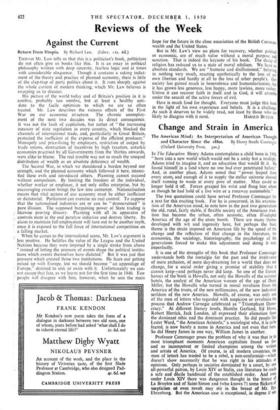Reviews of the Week
Against the Current
Return From Utopia. By Richard Law. (Faber. 12s. 6d.) THOUGH Mr. Law tells us that this is a politician's book, politicians do not often give us books like this. It is an essay in political philosophy written with deep sincerity, fearless logic and at times with considerable eloquence. Though it contains a raking indict- ment of the theory and practice of planned economy, there is little of the clap-trap of party politics about it. It runs sharply against the whole current of modern thinking, which Mr. Law believes is sweeping us to disaster.
His picture of the world today and of Britain's position in it is sombre, probably too sombre, but at least a healthy anti- dote to the facile optimism to which we are so often treated. Mr. Law describes the ruinous effects of the First War on our economic structure. The chronic unemploy- ment of the next two decades was its direct consequence. It was not the fault of capitalism, but rather of " the increasing measure of state regulation in every country, which blocked the channels of international trade, and, particularly in Great Britain, protected the inefficient at the expense of the efficient producer." Monopoly and price-fixing by employers, restriction of output by trade unions, destruction of incentives by high taxation, autarkic economies practised by all Governments from the 'thirties onwards, were alike to blame. The real trouble was not so much the unequal distribution of wealth as an absolute deficiency of wealth.
The Second War, in which we shouldered a burden beyond our strength, and the planned economy which followed it here, intensi- fied these evils and introduced others. Planning cannot succeed without compulsion. By limiting the freedom of the individual, whether worker or employer, it not only stifles enterprise, but by encouraging evasion brings the law into contempt. Nationalisation means that vital sectors of our economy must be either inefficient or dictatorial. Parliament can exercise no real control. To suppose that the nationalised industries are or can be " democratised " is pure illusion. The supposed bargaining power of State trading is likewise proving illusory. Planning with all its apparatus of controls must in the end paralyse initiative and destroy liberty. Its claim to maintain full employment will turn out to be another myth, '• once it is exposed to the full force of international competition on a falling market.
When he comes to the international scene, Mr. Law's argument is less positive. He belittles the value of the League and the United , Nations because they were impoSed by a single stroke from aboVe " instead of letting the pressure of events shape the political institu- tions which events themselves have dictated." But it was just that pressure which created those two institutions. He fears our getting mixed up with Europe, lest we should become " an appendage of Europe," destined to sink or swim with it. Unfortunately we can- ' not escape that fate, as we learnt not for the first time in 1940. Few people will disagree with him, however, when he sees the main hope for the future in the close association of the British Common wealth and the United States.
But in Mr. Law's view no plans for recovery, whether political or economic, are of much value without a moral purpose and sanction. That is indeed the keynote of his book. The decay of religion has reduced us to a state of moral nihilism. We have no absolute standards. We are " humane and disillusioned," believing in nothing very much, reacting apathetically to the loss of our own liberties and hardly at all to the loss of other people's. Our society has gained much in benevolence and humanitarianism, but it has grown less generous, less happy, more lawless, more violent. Unless it can recover faith in itself and in God, it will crumble under the assault of the active forces of evil.
Here is much food for thought. Everyone must judge this book in the light of his own experience and beliefs. It is a challenge. As such it deserves to be widely read, not least by those who are






































 Previous page
Previous page